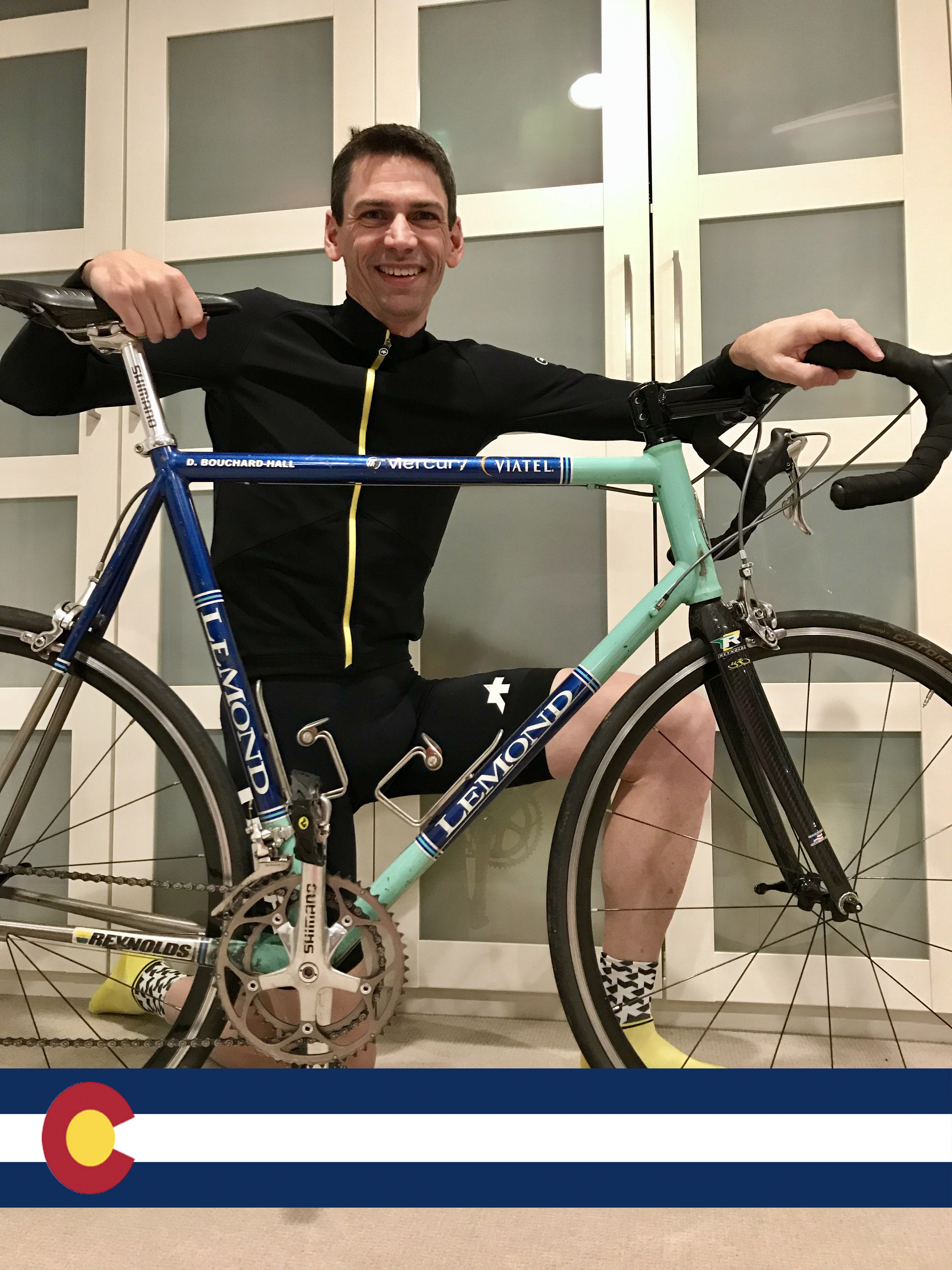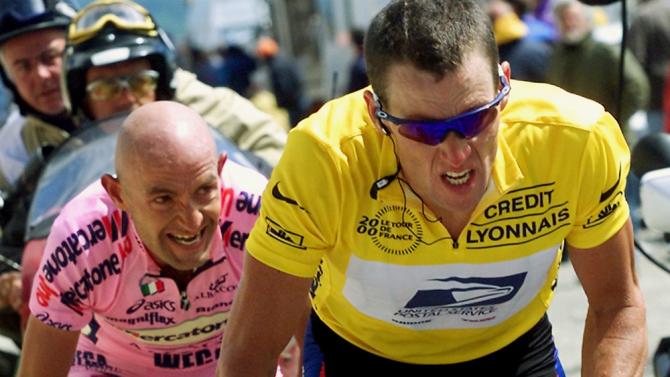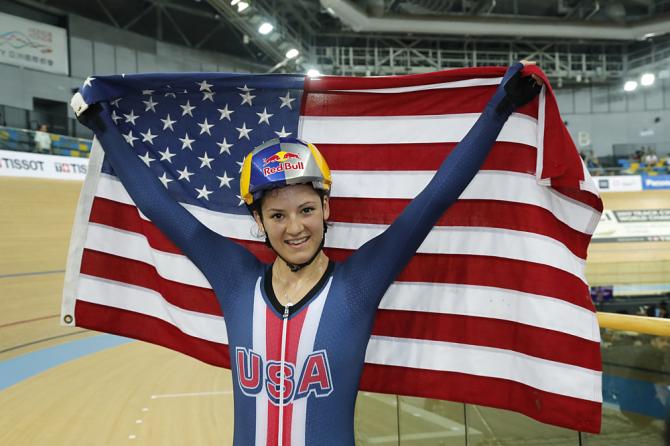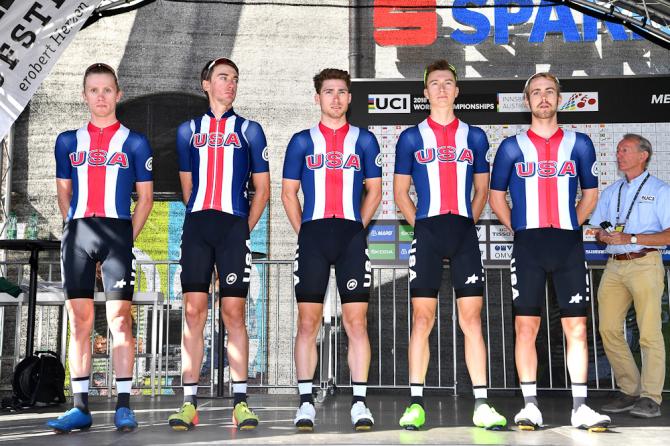Bouchard-Hall: Leaving a brighter future at USA Cycling
CEO on the Lance Armstrong era, rebuilding trust, and the state of American cycling

Come January, Derek Bouchard-Hall's time as the CEO and President of USA Cycling will be at an end. The American's three-and-a-half-year tenure has run alongside declining interest and participation in racing, a harsh financial climate, and a nation of fans still dealing with the sport's turbulent doping past. As part of Cyclingnews' Tour of Colorado, we sat down with Bouchard-Hall to talk about his time in charge, the challenges ahead, and whether he leaves USA Cycling in better health.
Derek Bouchard-Hall loves to talk about cycling. It doesn't matter what time of day - weekday or weekend - the former US criterium champion, and soon-to-be ex-CEO of USA Cycling, lives and breathes the sport.
Even on a dreary autumn afternoon in downtown Colorado Springs the former Mercury and Shaklee rider appears in good spirits as he takes us round the halls at USA Cycling. It's late in the day, winter is coming and most of the staff have filtered away for the evening. Those who are still here quietly shuffle along, going about their business in the grey and slightly dim surroundings - think Walking Dead meets The Office, and you wouldn't be a million miles away. But Bouchard-Hall is no Michael Scott - zombie version or not - and, as we reach his office on the second floor and cast a gaze across the shelves of memorabilia, it's once again clear just what cycling means to the 48-year-old father of two.
Yet, in just a matter of weeks, Bouchard-Hall's office will be cleared, family photos taken down and put in storage, as a new individual takes the hot seat. For now, at least, as he leans back in a chair that sits behind a coffee table of well-read cycling magazines, Bouchard-Hall can look back at his three-year tenure with a sense of satisfaction, even if it is tinged with regret over the fact he is moving on earlier than he would have originally liked.
When Bouchard-Hall took the position of CEO in summer of 2015 it's fair to say that USA Cycling was in a state of flux. Actually, that would be slightly unfair. It was in disarray. It had come through the damning USADA investigation of 2012 with its reputation severely tested, while the cycling community as a whole was still feeling the aftershocks of Lance Armstrong's eventual confession by the time Bouchard-Hall was unveiled as part of a new dawn. The fact that Steve Johnson, Bouchard-Hall's predecessor, came out of the USADA report with his credibility sorely scorched, yet was still in power until Bouchard-Hall's arrival, only intensified the post-Armstrong hangover.

Cycling isn't the new golf
The new CEO's first and most pressing task was to try and rebuild the relationships that USA Cycling had either burned or let wane. To add to that, the organization had a perception of being outdated, arrogant, and, in some aspects, irrelevant. The perception, from the outside at least, was that USA Cycling had surfed on the coattails of Armstrong's stardom and Tour de France wins and that during the post-Armstrong boom they had grown lethargic and complacent. Even in Bouchard-Hall's eyes, the nation's sporting body had a trust issue.
"We had a poor relationship with our community. There was significant distrust and it was an organization in turmoil," the former racer admits.
Get The Leadout Newsletter
The latest race content, interviews, features, reviews and expert buying guides, direct to your inbox!
"There was a lot of distrust about the organization. We were threatened by a lot of local organizations and events that just didn't want to work with us. That wasn't based on any value proposition concerns but simply because they didn't want to be associated with us. That was a real fear [Internally -ed] but we've changed that.
"We'd go out and see these race organizers but part of it was about showing to the community that we were trying the best that we could. I joke with my team that there was this perception that we didn't care and that we weren't doing a good job. We don't hear the 'you don't care' part anymore, although we do sometimes hear that we're not doing a good job, but in all seriousness that's progress. We're trying, and we're doing it for the right reasons."
Rebuilding trust wasn't the only spinning plate Bouchard-Hall had to deal with. Alongside Board Chairman Bob Stapleton, he cleared the decks at senior staff level, with a raft of new appointments made. However, simply replacing the furniture wasn't going to address the foundations and USA Cycling's decline in membership.
"Some will say look at the fact that the sport is still declining during my time here, and so I haven't been successful," Bouchard-Hall says.
There is a certainly a narrative that points to the decline of American cycling. The peak came in 2012 and one can look at it with a myriad of measures - whether it's bike sales or membership and participation numbers - but where there is no doubt is that there has been a decline.
"The impression, by some, is that this decline is unabated and not going to stop. People want to talk about the death of road cycling and I fundamentally disagree with that because the implication is that the decline will never stop and that eventually, the sport will become something different than it is today. The sport is definitely evolving, changing and contracting but that doesn't mean that it's going to go away," says Bouchard-Hall.
"People forget how much it was wrung up during the Armstrong era and how big it had become. They are comparing it to where it was five years ago, instead of the other side of the hump, and where it was 10 or 15 years ago. We have about a 30 per cent decline in road participation in racing compared to 2012. But when I retired from racing in 2002, USA Cycling had just less than 35,000 members. We hit a peak of around 63,000 in 2012 and people compare that number to the fact that we're down to around 53,000 members today. They see that as a drop but that 53,000 is way larger than when I was in the sport."

You can't engineer an icon
The fall of Lance Armstrong cut deep through US cycling. How long it takes for those wounds to heal remains unclear but USA Cycling recognized their responsibility to suture. The fact, however, remains that no matter how divisive Armstrong was or is, he was responsible for putting people on bikes and lifting sales. Like him or loathe him - it doesn't matter - there are pros in the sport now who were enticed to ride bikes because of the Texan. Not only has Bouchard-Hall had to deal with the shadow of seven missing maillots jaunes, but he has been left without an icon to fill the void. How different things might have been if Peter Sagan had heralded from Cincinnati or Chicago and not Slovakia.
"We lost our icon. Lance Armstrong was powerful for growing the sport and powerful because he transcended cycling. I've really come to believe that that's essential for a marquee athlete. They must transcend the sport," says Bouchard-Hall.
"We have lots of athletes today who are phenomenal and inspiring but they stay within the cycling world. Someone like Chloe Dygert is amazing and inspiring but she isn't broadly known outside of the cycling community. The thing with Lance was that he was so powerful and known outside of the cycling community. Lance was incredible as one part of the story. How you grow the sport in the absence is tough and we're constantly asking ourselves what more can we do."
Without an icon to pin their marketing strategy on, Bouchard-Hall and USA Cycling were forced to roll up their sleeves and put in the hard yards themselves.
Bouchard-Hall drove the donation offensive as far as he could and encouraged the US Olympic Committee to match a pledge with extra funding that would go towards the country's medal hopes at the 2020 Olympics in Tokyo, and while there may not have been an icon, he could point to the excellent crop of talent in women's elite cycling and BMX as reasons for additional funds.
"We also worked really hard on retaining members," he says, suggesting that this wasn't a major priority before his appointment. "We're still seeing a decline in participation but that decline is slowing. And our membership will be up this year for the first time in five years.
"We've also been working on enthusiast-based membership, so you don't have to have a racing license to become a member of USA Cycling. Our core member is always what will remain most important to us. We've had a little bit of success but I think that there's more to come.
"We're trying to work with a number of groups out there and we have the aspiration that every organized cycling event in America works with USA Cycling, regardless of the type of event. In many cases that involves using our insurance policy but it also could mean using our online registration system. We want to develop a range of things that help events work with us and recognize that there's a share shift there. It's good for the cycling ecosystem that we are there and trying to play a positive role."
A strategy built around diversification makes perfect sense, although it's yet another spinning plate for an organization that's still looking to cater to its core race audience. However, with online racing and training platforms, the growth of Fondos, and a regeneration of mountain biking all playing roles, USA Cycling at least has several opportunities to tap into.
"The decline in the sport is a lot about the racing side. The general interest in cycling remains very, very high," Bouchard-Hall insists.
"There's no doubt that there are different formats and two of those are Fondos and Gravel Grinders, for sure. Another thing for us is that there's been more interest in off-road and mountain biking. Then we have Zwift and Strava, which are other ways you can enjoy the sport without being under the sanction of USA Cycling. There has been some share shift that has been averse to USA Cycling but cycling still remains strong. There are still millions of people riding their bikes for fitness and fun, but the way they enjoy the sport is evolving."

On the battleground
Resources and the speed in which Bouchard-Hall can implement strategy have been major hurdles. Setting up a board that caters to a number of disciplines shows the right intentions but at times it can feel like herding cats, with each representative understandably looking out for his or her own interests.
Bouchard-Hall has a thick enough skin but he certainly isn't immune to criticism. He and the organization have taken hits over their declining numbers - although revenues are up - their pursuit of amateur doping and their lack of progress at working with several grassroots movements.
"Another would be that we've spent a lot of time on our IT systems and becoming relevant to enthusiasts, with only bits of the IT systems as yet released and only modest traction found with enthusiasts," he readily admits.
"Some say that was a wasted effort but I disagree with that assessment. It's fair to objectively look at how the organization is trending, but if you look at only one near-term metric you don't see the foundation built and the trade-offs that you have to make when you're running a complex organization.
"This is a complex organization. We're running a business, we think about the grassroots, we run elite programmes, we think about fundraising and donors, about the USOC and their requirements, we protect athletes, and it's darn complex. We have to run all that on limited resources and we just don't have the capacity to solve all the problems. We're trying to solve them without the resources that you'd want and that's incredibly challenging. We have a lot of plates spinning. You've got to be moving really quickly and you don't always get the solution right. I don't know how many times people have said 'it's only 50,000 dollars - can we just have 50,000 to do this?' There are a lot of $50,000 decisions made every day and they add up."
Given that Bouchard-Hall has laid solid foundations, it's somewhat difficult to understand why he is leaving the role when there's still so much to do. There have been a few rumors - that the board ground him down and that working for a taskmaster like Stapleton has taken its toll - all of which have officially been batted away by the outgoing CEO.
"It's quite personal, really. You have to balance a lot of things - my wife's career, where I want to raise my children, long-term career prospects - and it was just my interest in another opportunity that fit my life in a lot of ways. In aggregate it was the right decision to make."
Until 2017 Bouchard-Hall was splitting his time between Colorado and his previous home in London. Our last face-to-face meeting was in his London kitchen before he showed off a LeMond bike he raced his first and only edition of Paris-Roubaix on in 2001. The bike, which he still rides to this day, made the permanent journey with him and his family to the US in 2017 and it will take on the next leg of Bouchard-Hall's path to Switzerland, where he will take up leadership at the clothing company, Assos.
"I'm desperately sad to leave USA Cycling. It's difficult," he admits as dusk settles in around Colorado.
"I care about this organization and American racing. This has been way more than a job for me and more a mission and a calling. I always knew that I would go and do something else and that I wouldn't be here for life but I'm leaving earlier than I expected. It was a very hard decision to make. I'm jealous of the person who will follow me - there remains a lot of exciting and important work to be done."
At that point, the door opens and in steps a colleague to wish Bouchard-Hall a good evening. When they leave the CEO turns, taps his fingers on the coffee table, and says: "A lot of what I will leave is the team and the people here who will keep going. And it's a pretty darn good team.
"It's not so much about what I did with my time at USA Cycling but what they're going to do and continue to do. That will be the legacy.
"Cycling is great, the sport is great, it's compelling and there are still millions of people that do it. Our sport is awesome, whether it's elite level or someone just riding on a quiet road. There's a lot to this sport and it's not going away."
Sadly, Bouchard-Hall is going away, and USA Cycling will miss his enthusiasm and integrity. These are big shoes to fill.
It's almost pitch-black when we reach the parking lot outside the building's headquarters, with only the light from Bouchard-Hall's office offering any form of illumination. There are still some dark and challenging days ahead for USA Cycling but at least Bouchard-Hall has taken them some way towards a brighter future.
Daniel Benson was the Editor in Chief at Cyclingnews.com between 2008 and 2022. Based in the UK, he joined the Cyclingnews team in 2008 as the site's first UK-based Managing Editor. In that time, he reported on over a dozen editions of the Tour de France, several World Championships, the Tour Down Under, Spring Classics, and the London 2012 Olympic Games. With the help of the excellent editorial team, he ran the coverage on Cyclingnews and has interviewed leading figures in the sport including UCI Presidents and Tour de France winners.
